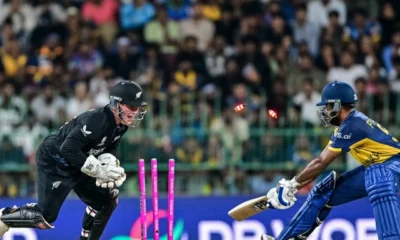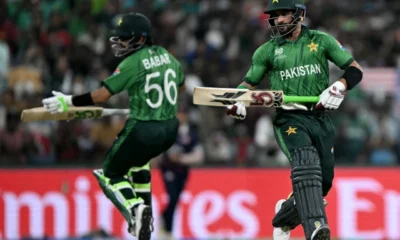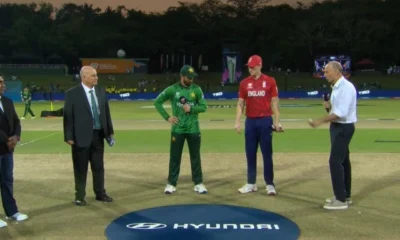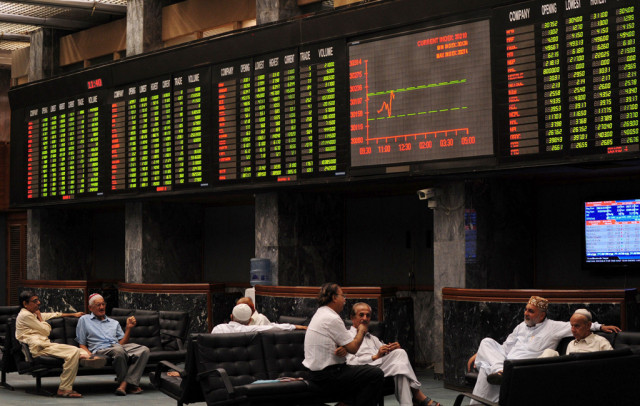Sports
Pakistan thrash Bangladesh 8-2 in series opener in Dhaka | The Express Tribune
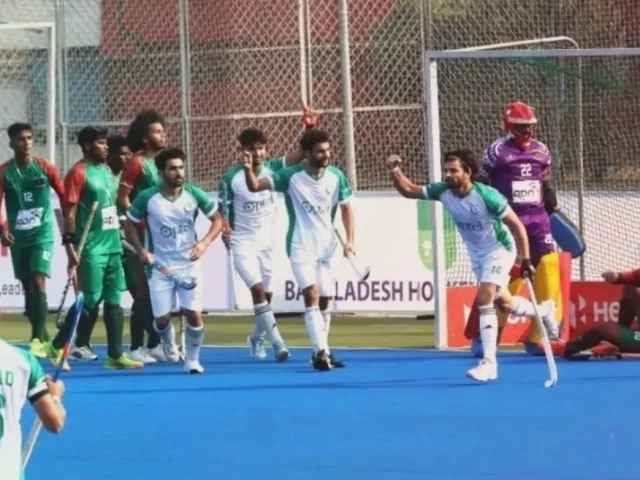
Pakistan made a flying start to their three-match play-off series against Bangladesh, cruising to an 8-2 victory in Thursday’s opener at Dhaka’s Maulana Bhashani Hockey Stadium.
Afraz and Nadeem Ahmed each scored twice for the visitors, while Ammad Butt, Ghazanfar Ali, Waheed Ashraf Rana, and Hannan Shahid also found the net. Bangladesh’s Hozifa Hossain and Amirul Islam scored the lone goals for the hosts.
The home side began brightly, blocking three early Pakistani attacks within the first minute. But Pakistan soon asserted control, with captain Ammad Butt converting a penalty stroke in the fourth minute to break the deadlock. Bangladesh suffered an early blow when goalkeeper Roman Sarkar sustained a head injury from the same play and was stretchered off.
Hozifa briefly revived home hopes with a reverse-hit goal just before the first quarter ended, but Nadeem restored Pakistan’s lead in the 19th minute. Afraz extended the advantage with a penalty corner in the 24th minute and followed it with a fine field goal six minutes later. Pakistan dominated possession for the remainder of the match, adding four more goals through sharp finishing and fluid passing.
Bangladesh managed to convert only one of their penalty corner opportunities in the second half, with Amirul scoring in the 58th minute. Skipper Rezaul Karim Babu acknowledged lapses in concentration and vowed to bounce back in the remaining fixtures.
The series continues on Friday, with the third and final match set for Sunday. The aggregate winner will advance to the 2026 FIH Men’s World Cup qualifying round.
Sports
Third victim dies from injuries in Rhode Island rink shooting
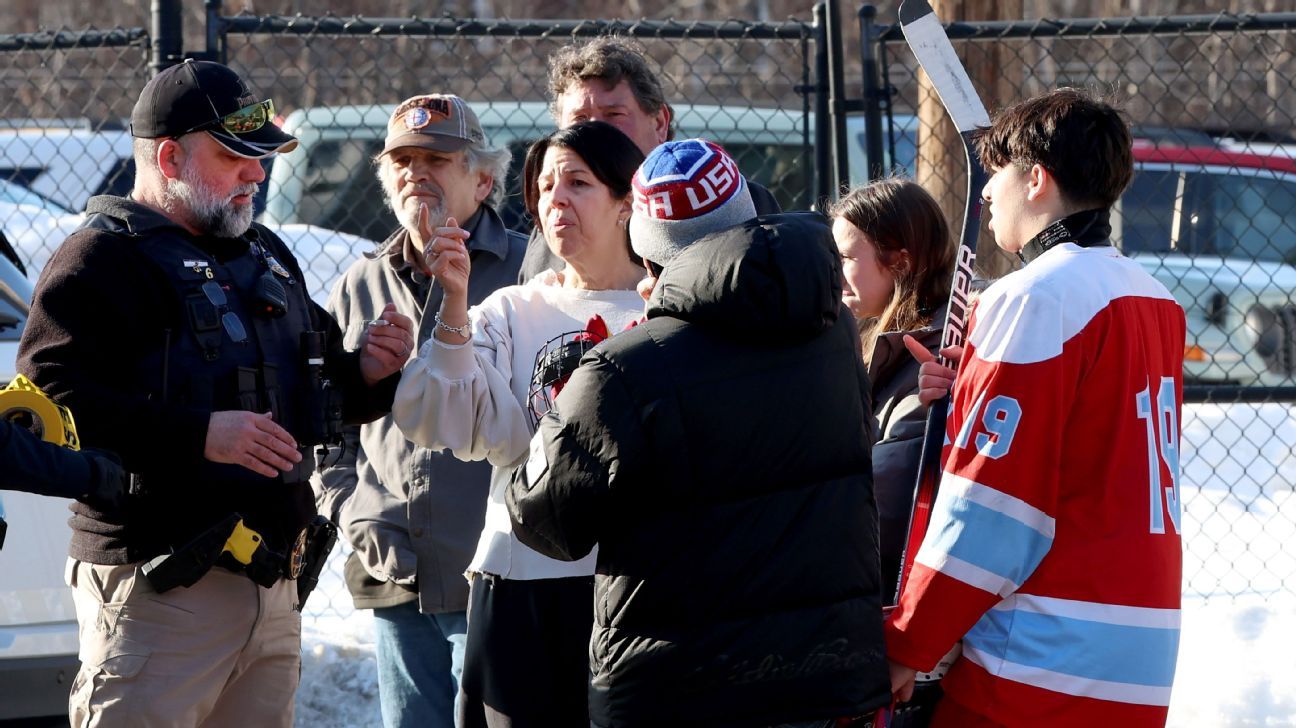
PROVIDENCE, R.I. — A deadly shooting during a youth hockey game in Rhode Island last week claimed a third victim, a grandfather whose daughter and grandson were also killed in the attack, authorities said Wednesday.
Gerald Dorgan, who had been in critical condition, died from his injuries, according to Pawtucket police.
Pawtucket Mayor Donald Grebien said he was heartbroken that another person had died because of the shooting.
“Our thoughts and prayers remain with the victim’s family, friends, and all those impacted by this tragic act of violence,” he said in a statement.
Dorgan’s daughter, Rhonda Dorgan, and grandson, Aidan Dorgan, were also killed in the shooting.
Police identified the shooter as Robert Dorgan, 56, who died from an apparent self-inflicted gunshot wound. Dorgan also went by the names Roberta Esposito and Roberta Dorgano, authorities said. Robert Dorgan’s ex-wife was Rhonda Dorgan and adult son was Aidan Dorgan.
Officials have said the shooter was specifically targeting family members.
Rhonda Dorgan’s mother, Linda Dorgan, and a family friend, Thomas Geruso, were wounded.
Law enforcement have credited several people who intervened and quickly stopped the attack. At least three bystanders were able to contain the shooter in the middle of the stands as the crowd fled and ran around them.
Sports
Who has the advantage at WWE Elimination Chamber? Notes, stats and history to consider

Less than two months remain until WrestleMania 42 from Las Vegas in April, and this Saturday marks a critical stop along the way. Chicago’s United Center will host the 16th WWE Elimination Chamber premium live event (7 p.m. ET on ESPN Unlimited), where the WrestleMania card will continue to be constructed.
The show will feature both men’s and women’s Elimination Chamber matches, during which six wrestlers, surrounded by a steel cage structure, work to pin or submit their opponents until one winner is left standing. That wrestler receives a championship opportunity at WrestleMania. CM Punk will also defend his World Heavyweight Championship in his hometown against Finn Bálor. And the Becky Lynch vs. AJ Lee saga continues with the Women’s Intercontinental Championship on the line.
Here are the notes, stats and Elimination Chamber history to know heading into Saturday’s event.
Men’s Elimination Chamber
Participants: Randy Orton, Cody Rhodes, LA Knight, Je’Von Evans, Trick Williams and Jey Uso
1:04
Cody Rhodes: ‘I need to officially point at the WrestleMania sign’
Cody Rhodes previews the Elimination Chamber against Randy Orton, LA Knight, Je’Von Evans and Trick Williams, readying to punch his ticket to WrestleMania.
• The first Elimination Chamber match occurred 23 years ago at Survivor Series in 2002. Shawn Michaels won the match to become world heavyweight champion.
• There have been 36 men’s and women’s Elimination Chamber matches combined, 11 of which have produced new champions.
• Triple H and John Cena share the distinction of most Elimination Chamber victories with four each. Daniel Bryan is next with three. Cena is the most recent Elimination Chamber winner, having won the men’s match in 2025. He turned heel and claimed his record-setting 17th championship the following month at WrestleMania 41.
• This will be a record-setting 10th Elimination Chamber match for Orton. Chris Jericho and Cena sit two back of Orton in the record book with eight entrants. If Orton records two eliminations in Saturday’s match, he will tie Jericho for the most all time (10). Orton is the only participant in the match with an Elimination Chamber win. He won in 2014 and retained the world title on his way to the WrestleMania 30 main event.
• Rhodes has lost three consecutive PLE matches, dating back to Crown Jewel in October 2025. It is Rhodes’ longest PLE losing streak since he returned to the WWE at WrestleMania 38 in 2022. On Saturday, Rhodes will make his first Elimination Chamber appearance since his WWE return, but not his first ever. In his first WWE stint, he took part in the World Heavyweight Championship Elimination Chamber match, won by Bryan in 2012.
• Uso won five straight WWE PLE matches from November 2024 to August 2025 — including his World Heavyweight Championship win at WrestleMania 41. Since then, he’s on a four-match PLE losing streak for the first time since 2020-21.
• Knight is looking for a change in luck at the Elimination Chamber. It has been more than a year since Knight has won a PLE match. Since Crown Jewel in November 2024, he has lost seven consecutive PLE bouts.
Women’s Elimination Chamber
Participants: Alexa Bliss, Tiffany Stratton, Rhea Ripley, Asuka, Kiana James and Raquel Rodriguez
• The first women’s Elimination Chamber match occurred in 2018. Bliss won the match and retained her “Raw” women’s championship. This will be the eighth women’s Elimination Chamber match in history.
• The only superstar with multiple women’s Elimination Chamber wins is Bianca Belair (2022 and 2025). Bliss or Asuka could join her on that list this weekend.
• Stratton is aiming to avoid her third straight WWE PLE loss after Liv Morgan eliminated her to win the Royal Rumble and Stephanie Vaquer defeated her to win the 2025 Crown Jewel Championship. Stratton hasn’t experienced a three-loss skid in PLE matches since her first three on the main roster in early 2024.
• Asuka has not won a match at a PLE event since Elimination Chamber in 2024, when the Kabuki Warriors defeated Candice LeRae and Indi Hartwell to retain the Women’s Tag Team Championship.
• Rodriguez could earn her first career singles victory at a WWE PLE this weekend. Rodriguez, who holds the women’s record for tag title reigns with six, has accumulated only tag team victories in her WWE PLE career.
• Will anyone run the table in this match? Only one wrestler, Shayna Baszler in 2020, has ever recorded every elimination in an Elimination Chamber match.
World Heavyweight Championship: CM Punk vs. Finn Bálor
1:24
Previewing CM Punk vs. Finn Balor at Elimination Chamber
Arda Ocal previews a huge match for the world heavyweight title between CM Punk and Finn Balor at Elimination Chamber in Chicago.
• The winner of this match is destined for a WrestleMania collision with Roman Reigns. Bálor defeated Reigns on his first night on the WWE main roster — the July 25, 2016, edition of “Raw.”
• This will be CM Punk’s first PLE match in Chicago since he took down Jericho at Payback in 2013. Overall, he has wrestled in six WWE PLE matches from Chicago and has a 4-2 record. One of Punk’s two UFC fights also occurred in Chicago.
• Punk is in the midst of an impressive run. He has not lost a match in more than two months. During that stretch, he successfully has retained the World Heavyweight Championship in three television matches against Bron Breakker, AJ Styles and his Elimination Chamber opponent, Bálor.
• It has been two years since Bálor last won a PLE match. In fact, his last such win occurred at the 2024 Elimination Chamber. At that event, he and Damian Priest successfully defended their tag titles against Pete Dunne and Tyler Bate.
Women’s Intercontinental Championship: Becky Lynch vs. AJ Lee
1:05
Best moments of WWE Elimination Chamber history
Relive some of the top moments of Elimination Chamber history as we gear up for Saturday’s event.
• Lee will compete in her first championship match in more than 11 years. Her last title bout occurred in December 2014, when she battled Nikki Bella at Tables, Ladders and Chairs … and Stairs for the Divas Championship.
• Lynch is 3-0 at Elimination Chamber. Her last such win occurred in 2024, when she won the women’s Elimination Chamber match.
• Lee will make her second career Chicago PLE appearance after she defeated Kaitlyn to win the Divas Championship at Payback in 2013.
Sports
Cristiano Ronaldo purchases 25% stake in Spanish club Almeria
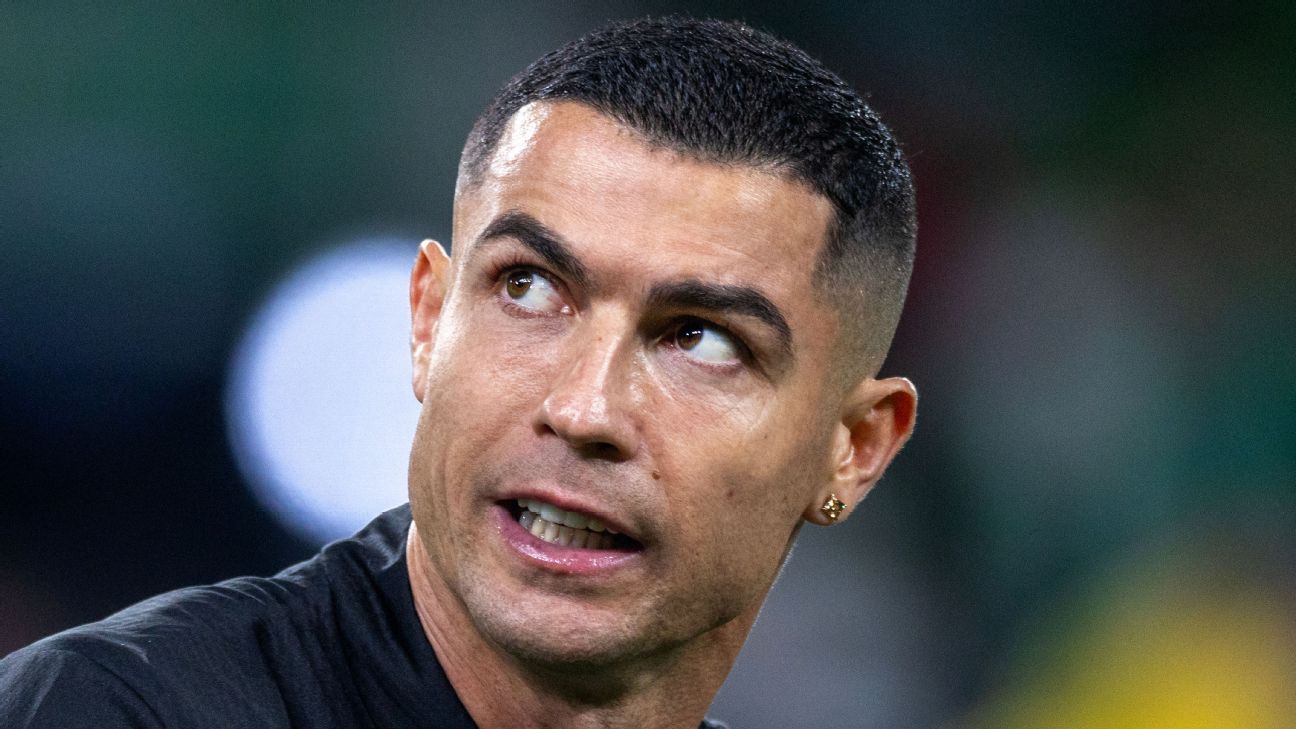
Cristiano Ronaldo has acquired a 25% ownership stake in Spanish second division club UD Almeria.
The financial terms of the transaction, done through the Portugal captain’s CR7 Sports Investments company, have not been disclosed but the deal is considered a long-term strategic investment from Ronaldo.
“I have long had the ambition to contribute to football beyond the pitch,” Ronaldo said in a statement.
“UD Almería is a Spanish club with a strong foundation and clear growth potential. I wish to work with the team leading the club to support it in its new phase of growth.”
UD Almeria were taken over by a Saudi Investment group in May 2025.
Ronaldo, who turned 41 on Feb. 5, has in the past expressed his desire to own a football club once he retired.
– Cristiano Ronaldo goal tracker: Road to 1,000 career goals
– Cristiano Ronaldo reaffirms commitment: ‘I belong to Saudi Arabia’
The former Real Madrid star last summer extended his contract with Saudi Pro League club Al Nassr through June 2027 and is expected to captain Portugal this summer in what will be a record sixth World Cup.
UD Almeria president Mohamed al Khereiji is thrilled to have the five-time Ballon d’Or winner on board.
“He is considered the best on the pitch,” Al Khereiji said. “He knows the Spanish leagues very well and understands the potential of what we are building here both in terms of the team and the youth academy.”
Relegated to the second division in April 2024, Almeria are on course to gain promotion to Spain’s top fight this season. They are third in Spain’s second tier, two points adrift of leaders Racing Santander after 27 games.
-

 Tech7 days ago
Tech7 days agoA $10K Bounty Awaits Anyone Who Can Hack Ring Cameras to Stop Sharing Data With Amazon
-

 Fashion6 days ago
Fashion6 days agoICE cotton ticks higher on crude oil rally
-

 Business6 days ago
Business6 days agoUS Top Court Blocks Trump’s Tariff Orders: Does It Mean Zero Duties For Indian Goods?
-

 Business5 days ago
Business5 days agoEye-popping rise in one year: Betting on just gold and silver for long-term wealth creation? Think again! – The Times of India
-

 Entertainment5 days ago
Entertainment5 days agoViral monkey Punch makes IKEA toy global sensation: Here’s what it costs
-

 Sports6 days ago
Sports6 days agoBrett Favre blasts NFL for no longer appealing to ‘true’ fans: ‘There’s been a slight shift’
-

 Entertainment6 days ago
Entertainment6 days agoThe White Lotus” creator Mike White reflects on his time on “Survivor
-

 Sports5 days ago
Sports5 days agoHow James Milner broke Premier League’s appearances record


